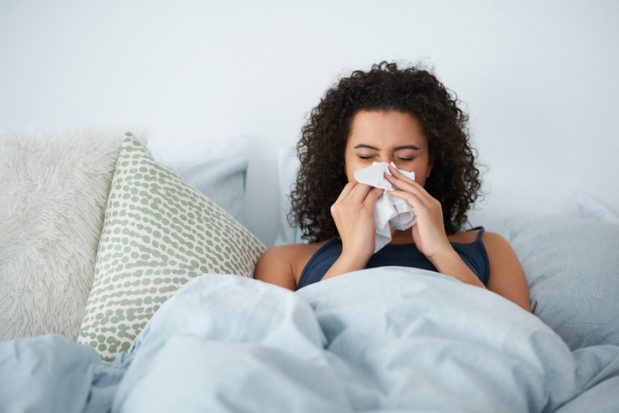
The pandemic is not yet over, but the success of the vaccination programme means the majority of people who become infected with COVID-19 will no longer become seriously ill. However, being vaccinated does not make you immune to infection or prevent you from passing infection on.
Learning to live with COVID relies on us all taking sensible actions to help stop the spread of the virus and other respiratory infections, which in turn will help to protect those who are most vulnerable.
Although legal requirements around COVID-19 measures have been lifted, you are strongly encouraged to follow this public health advice so we can all enjoy our regained freedoms safely.
Advice for adults aged over 18 with symptoms of respiratory infections including COVID-19
If you have symptoms of a respiratory infection such as COVID-19 , and you have a high temperature or feel unwell, you should try to stay at home and avoid contact with others until you no longer have a high temperature (if you had one) or until you no longer feel unwell.
Symptoms of COVID-19, flu and common respiratory infections include:
- continuous cough
- high temperature, fever or chills
- loss of, or change in, your normal sense of taste or smell
- shortness of breath
- unexplained tiredness, lack of energy
- muscle aches or pains that are not due to exercise
- not wanting to eat or not feeling hungry
- headache that is unusual or longer lasting than usual
- sore throat, stuffy or runny nose
- diarrhoea, feeling sick or being sick
If you have any of these symptoms, it is particularly important to avoid close contact with anyone you know who is at higher risk of becoming seriously unwell if they were to develop infection especially those whose immune system means that they are at higher risk of serious illness, despite vaccination
If possible, try to work from home if you can. If you are unable to work from home, talk to your employer about options available to you. While you feel unwell, you may wish to ask family, friends or neighbours to get food and other essentials for you. If you do need to leave home while unwell, make sure to take the following precautions: wear a face covering or surgical face mask, avoid crowded or enclosed spaces and cover your mouth and nose when you cough and sneeze. Wash your hands regularly.
Actions for adults aged over 18 with a positive COVID-19 test
Widespread testing is no longer available, though some people will continue to test due to workplace requirements or to manage risk to other people. If you do have a positive test result, you should try and stay at home and avoid contact with other people for 5 days after the day you took a test. You should also avoid meeting people who at higher risk of becoming seriously unwell from COVID-19 for 10 days after the day you took a test to make sure that you are no longer infectious.
If you have to leave your home whilst feeling unwell or within the 5-day period following a positive test, you should wear a face covering; avoid crowded places such as public transport, large social gatherings and enclosed or poorly ventilated spaces; exercise outdoors and away from others; and always remember good hand and respiratory hygiene.
Advice for close contacts
People who live in the same household as someone with a positive COVID-19 test are most at risk of becoming infected, as they are likely to have prolonged contact with the infectious person.
It can take up to 10 days for infection to develop in close contacts, and during that period you should, avoid contact with people you know are at higher risk of becoming seriously unwell and limit close contact with people outside your household, especially in crowded spaces.
If you develop symptoms during this period, you should follow guidance for people with symptoms.
Advice for children and young people aged 18 and younger
Respiratory infections are common in children and young people but we know they are at a lower risk from COVID-19 infection, compared to the wider harms of missed or disrupted education.
Given the importance of education, children and young people should continue to attend their nursery, school, college or university if they have mild respiratory symptoms. Only if they are unwell or have a high temperature should they stay at home. They should avoid contact with other people until they feel well enough or no longer have a temperature.
COVID-19 testing is no longer recommended for children and young people aged 18 years and younger unless directed by a health professional. If they do test positive for COVID-19 they should try and avoid contact with others for 3 days after the day they took a test. After 3 days, they can resume normal activities, including returning to education, provided they feel well and do not have a high temperature. It’s also recommended that children and young people who live with someone who has tested positive for COVID-19 continue to attend their education setting as usual.
For more information see our guidance: People with symptoms of a respiratory infection including COVID-19
